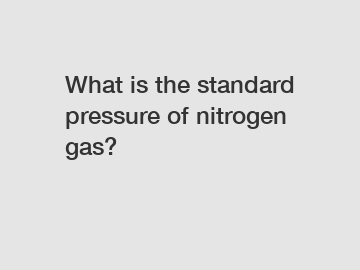What is the standard pressure of nitrogen gas?
The standard pressure of nitrogen gas is 1 atmosphere, which is equivalent to 101.325 kilopascals or 14.7 pounds per square inch (psi). This value is commonly used as a reference point for measuring gas pressures in various industrial applications, as well as in scientific research and experimentation.
Nitrogen is the most abundant gas in Earth's atmosphere, making up about 78% of the air we breathe. It is a non-reactive, colorless, odorless gas that plays a crucial role in supporting life on our planet. At standard pressure, nitrogen exists as diatomic molecules (N2) that are relatively stable and inert under normal conditions.
The standard pressure of nitrogen gas is determined by its atmospheric concentration and the weight of the air column above a given point on Earth's surface. As air is a mixture of gases, the pressure exerted by each gas is proportional to its fractional concentration in the atmosphere. This means that nitrogen gas, being the most abundant gas in the air, contributes significantly to the overall atmospheric pressure.

The standard pressure of nitrogen gas has important practical implications in various fields of science and industry. For example, in chemistry and physics, it is used as a reference point for measuring pressures in gas-phase reactions and experiments. In the field of meteorology, knowledge of the standard pressure of nitrogen gas is essential for understanding atmospheric dynamics and weather patterns.
Furthermore, in industrial applications such as food packaging, pharmaceutical manufacturing, and semiconductor production, nitrogen gas is commonly used as a purging agent to displace oxygen and other gases that can degrade the quality of products or processes. By knowing the standard pressure of nitrogen gas, engineers and technicians can precisely control the gas flow rates and pressures needed to maintain optimal production conditions.
In conclusion, the standard pressure of nitrogen gas is a fundamental parameter that underpins our understanding of atmospheric dynamics, gas behavior, and industrial processes. By knowing this value, scientists, engineers, and researchers can effectively design experiments, optimize processes, and ensure the safety and efficiency of various applications involving nitrogen gas.
If you want to learn more, please visit our website nitrogen compressor for home, hydraulic hose testing machine, propane pump.

Comments
0